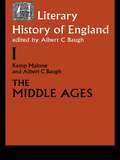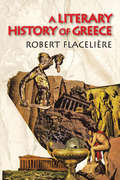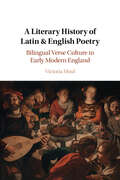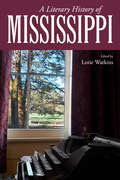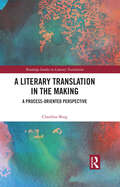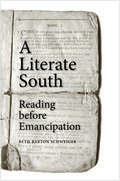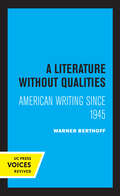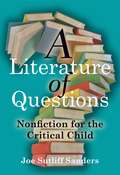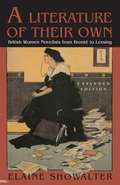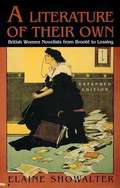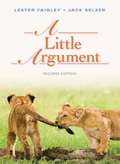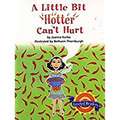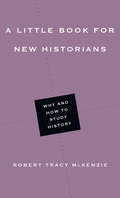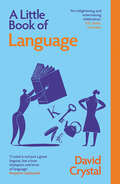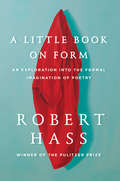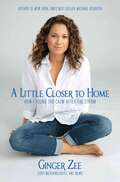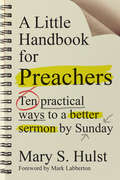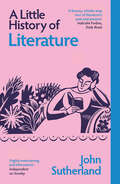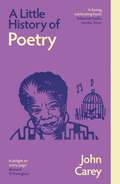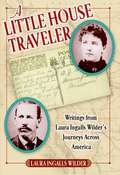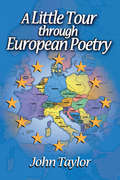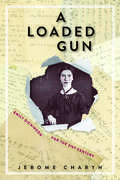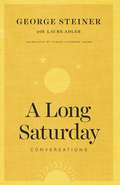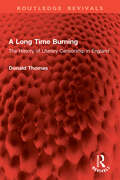- Table View
- List View
A Literary History of England: Vol 1: The Middle Ages (to 1500)
by Albert C. Baugh Kemp MaloneThe paperback edition, in four volumes, of this standard work will make it readily available to students. The scope of the work makes it valuable as a work of reference, connecting one period with another and placing each author clearly in the setting of his time. Reviewing the first edition, The Times Literary Supplement commented: ‘in inclusiveness and in judgment it has few rivals of its kind’. This first volume covers The Middle Ages (to 1500) in two sections: The Old English Period (to 1100) by Kemp Malone (John Hopkins University), and The Middle English Period (1100-1500) by Albert C. Baugh (University of Pennsylvania).
A Literary History of Greece
by Robert FlaceliereThere are several good histories of Greek literature of various shapes and sizes, but the purpose of this book is not simply to consider the literature of ancient Greece as an isolated subject, treating each of the literary modes - epic, lyric, drama, history, philosophy, and rhetoric - in terms of its own evolution. Instead, Robert Flaceliere provides a Greek history that deals with all the important works of Hellenic literature that are still of interest to contemporary readers; and he does this in chronological order with an accurate account of their historical background.Flaceliere follows the history of Greece down through the centuries as the writer records it. He describes the political atmosphere in the nation and the advances in the other arts that influenced literature. The author understands Sappho's rhapsodies; girlish love in the context of the acceptance of homosexuality in that era. He sympathizes with the unrequited passion of the penniless Archilochos. He appreciates Pindar's pacifist tendencies, Herodotus' upright insistence on truth, and Euripides' doubts about the existence of the gods. For the classical centuries, so rich in talent and genius, the author follows the successive generations systematically so as to distinguish the special features of each, what it owes to the preceding generation and how it paves the way for the next.Since this is a literary history, attention is mainly focused on the writers and their works, but by displaying these in their political, social, artistic and scientific setting, Flaceliere gives a better understanding of the production and significance of these wonderful achievements of the human spirit. Due to the wide range of material presented, "A Literary History of Greece" can be used as a reference book as well as for enjoyment reading.
A Literary History of Latin & English Poetry: Bilingual Verse Culture in Early Modern England
by Victoria MoulVictoria Moul's groundbreaking study uncovers one of the most important features of early modern English poetry: its bilingualism. The first guide to a forgotten literary landscape, this book considers the vast quantities of poetry that were written and read in both Latin and English from the sixteenth to the eighteenth century. Introducing readers to a host of new authors and drawing on hundreds of manuscript as well as print sources, it also reinterprets a series of landmarks in English poetry within a bilingual literary context. Ranging from Tottel's miscellany to the hymns of Isaac Watts, via Shakespeare, Jonson, Herbert, Marvell, Milton and Cowley, this revelatory survey shows how the forms and fashions of contemporary Latin verse informed key developments in English poetry. As the complex, highly creative interactions between the two languages are revealed, the work reshapes our understanding of what 'English' literary history means.
A Literary History of Mississippi (Heritage of Mississippi Series)
by Lorie WatkinsWith contributions by Ted Atkinson, Robert Bray, Patsy J. Daniels, David A. Davis, Taylor Hagood, Lisa Hinrichsen, Suzanne Marrs, Greg O'Brien, Ted Ownby, Ed Piacentino, Claude Pruitt, Thomas J. Richardson, Donald M. Shaffer, Theresa M. Towner, Terrence T. Tucker, Daniel Cross Turner, Lorie Watkins, and Ellen WeinauerMississippi is a study in contradictions. One of the richest states when the Civil War began, it emerged as possibly the poorest and remains so today. Geographically diverse, the state encompasses ten distinct landform regions. As people traverse these, they discover varying accents and divergent outlooks. They find pockets of inexhaustible wealth within widespread, grinding poverty. Yet the most illiterate, disadvantaged state has produced arguably the nation's richest literary legacy. Why Mississippi?What does it mean to write in a state of such extremes? To write of racial and economic relations so contradictory and fraught as to defy any logic? Willie Morris often quoted William Faulkner as saying, "To understand the world, you must first understand a place like Mississippi." What Faulkner (or more likely Morris) posits is that Mississippi is not separate from the world. The country's fascination with Mississippi persists because the place embodies the very conflicts that plague the nation.This volume examines indigenous literature, Southwest humor, slave narratives, and the literature of the Civil War. Essays on modern and contemporary writers and the state's changing role in southern studies look at more recent literary trends, while essays on key individual authors offer more information on luminaries including Faulkner, Eudora Welty, Richard Wright, Tennessee Williams, and Margaret Walker. Finally, essays on autobiography, poetry, drama, and history span the creative breadth of Mississippi's literature. Written by literary scholars closely connected to the state, the volume offers a history suitable for all readers interested in learning more about Mississippi's great literary tradition.
A Literary Translation in the Making: A Process-Oriented Perspective (Routledge Studies in Literary Translation)
by Claudine BorgThis book presents a holistic picture of the practice of an experienced literary translator working in situ, highlighting the value of in-depth process studies for the discipline and offering a model for future similar studies. Bringing together Cognitive Translation Studies (CTS) and literary translation, Borg interrogates existing assumptions in CTS and sheds light on the value of a combined look at both cognitive and social processes in literary translation. The volume extends the scope of existing CTS studies with its comprehensive examination of the work of one translator and exploration of the wide range of materials from draft to finished translation. This unique model allows for a greater understanding of the actions, decisions, motivations, and work practices of individual translators as well as of their interactions with other participants in the practice of a literary translation. Making the case for in-depth process research in illuminating the dynamics of translation production and working practices, this innovative book will be of interest to students and scholars in translation and interpreting studies, especially those interested in literary translation and cognitive approaches.
A Literate South: Reading before Emancipation
by Beth Barton SchweigerA provocative examination of literacy in the American South before emancipation, countering the long-standing stereotype of the South’s oral tradition Schweiger complicates our understanding of literacy in the American South in the decades just prior to the Civil War by showing that rural people had access to a remarkable variety of things to read. Drawing on the writings of four young women who lived in the Blue Ridge Mountains, Schweiger shows how free and enslaved people learned to read, and that they wrote and spoke poems, songs, stories, and religious doctrines that were circulated by speech and in print. The assumption that slavery and reading are incompatible—which has its origins in the eighteenth century—has obscured the rich literate tradition at the heart of Southern and American culture.
A Literature Without Qualities: American Writing Since 1945 (Quantum Books)
by Warner B. BerthoffThis title is part of UC Press's Voices Revived program, which commemorates University of California Press’s mission to seek out and cultivate the brightest minds and give them voice, reach, and impact. Drawing on a backlist dating to 1893, Voices Revived makes high-quality, peer-reviewed scholarship accessible once again using print-on-demand technology. This title was originally published in 1979.
A Literature of Questions: Nonfiction for the Critical Child
by Joe Sutliff SandersNonfiction books for children—from biographies and historical accounts of communities and events to works on science and social justice—have traditionally been most highly valued by educators and parents for their factual accuracy. This approach, however, misses an opportunity for young readers to participate in the generation and testing of information. In A Literature of Questions, Joe Sutliff Sanders offers an innovative theoretical approach to children&’s nonfiction that goes beyond an assessment of a work&’s veracity to develop a book&’s equivocation as a basis for interpretation. Addressing how such works are either vulnerable or resistant to critical engagement, Sanders pays special attention to the attributes that nonfiction shares with other forms of literature, including voice and character, and those that play a special role in the genre, such as peritexts and photography. The first book-length work to theorize children&’s nonfiction as nonfiction from a literary perspective, A Literature of Questions carefully explains how the genre speaks in unique ways to its young readers and how it invites them to the project of understanding. At the same time, it clearly lays out a series of techniques for analysis, which it then applies and nuances through extensive close readings and case studies of books published over the past half century, including recent award-winning books such as Tanya Lee Stone&’s Almost Astronauts: Thirteen Women Who Dared to Dream and We Are the Ship: The Story of Negro League Baseball by Kadir Nelson. By looking at a text&’s willingness or reluctance to let children interrogate its information and ideological context, Sanders reveals how nonfiction can make young readers part of the project of learning rather than passive recipients of information.
A Literature of Their Own: British Women Novelists from Bronte to Lessing
by Elaine ShowalterWhen first published in 1977, A Literature of Their Own quickly set the stage for the creative explosion of feminist literary studies that transformed the field in the 1980s. Launching a major new area for literary investigation, the book uncovered the long but neglected tradition of women writers in England. A classic of feminist criticism, its impact continues to be felt today. This revised and expanded edition contains a new introductory chapter surveying the book's reception and a new postscript chapter celebrating the legacy of feminism and feminist criticism in the efflorescence of contemporary British fiction by women.
A Literature of Their Own: British Women Novelists from Brontë to Lessing
by Elaine ShowalterWhen first published in 1977, "A Literature of Their Own" quickly set the stage for the creative explosion of feminist literary studies that transformed the field in the 1980s. Launching a major new area for literary investigation, the book uncovered the long but neglected tradition of women writers in England. A classic of feminist criticism, its impact continues to be felt today. This revised and expanded edition contains a new introductory chapter surveying the book's reception and a new postscript chapter celebrating the legacy of feminism and feminist criticism in the efflorescence of contemporary British fiction by women.
A Little Argument
by Jack Selzer Lester B. FaigleyThis remarkable, inexpensive guide packs a comprehensive look at writing (and analyzing) arguments into 200 brief, accessible pages. Best-selling authors Lester Faigley and Jack Selzer offer clear, engaging chapters covering what argument is, how to read (and view) arguments critically, how to write a variety of persuasive arguments, and how to support your arguments with good reasons and appropriate documentation.
A Little Bit “Hotter” Can’t Hurt [Grade 3]
by Joanna Korba Bethann ThornburghNIMAC-sourced textbook
A Little Book for New Historians: Why and How to Study History (Little Books Series)
by Robert Tracy McKenzieMany people think of history as merely "the past"—or at most, information about the past. But the real work of a historian is to listen to the voices of those who have gone before and humbly remember the flesh and blood on the other side of the evidence. What is their story? How does it become part of our own? In A Little Book for New Historians veteran historian Robert Tracy McKenzie offers a concise, clear, and beautifully written introduction to the study of history. In addition to making a case for the discipline in our pragmatic, "present-tense" culture, McKenzie lays out necessary skills, methods, and attitudes for historians in training. Loaded with concrete examples and insightful principles, this primer shows how the study of history, faithfully pursued, can shape your heart as well as your mind.
A Little Book of Language (Little Histories)
by David CrystalWith a language disappearing every two weeks and neologisms springing up almost daily, an understanding of the origins and currency of language has never seemed more relevant. In this charming volume, a narrative history written explicitly for a young audience, expert linguist David Crystal proves why the story of language deserves retelling. From the first words of an infant to the peculiar modern dialect of text messaging, A Little Book of Language ranges widely, revealing language's myriad intricacies and quirks. In animated fashion, Crystal sheds light on the development of unique linguistic styles, the origins of obscure accents, and the search for the first written word. He discusses the plight of endangered languages, as well as successful cases of linguistic revitalization. Much more than a history, Crystal's work looks forward to the future of language, exploring the effect of technology on our day-to-day reading, writing, and speech. Through enlightening tables, diagrams, and quizzes, as well as Crystal's avuncular and entertaining style, A Little Book of Language will reveal the story of language to be a captivating tale for all ages.
A Little Book on Form: An Exploration into the Formal Imagination of Poetry
by Robert HassAn acute and deeply insightful book of essays exploring poetic form and the role of instinct and imagination within form—from former poet laureate, Pulitzer Prize and National Book Award winning author Robert Hass.Robert Hass—former poet laureate, winner of the National Book Award, and recipient of the Pulitzer Prize—illuminates the formal impulses that underlie great poetry in this sophisticated, graceful, and accessible volume of essays drawn from a series of lectures he delivered at the renowned Iowa Writers’ Workshop.A Little Book on Form brilliantly synthesizes Hass’s formidable gifts as both a poet and a critic and reflects his profound education in the art of poetry. Starting with the exploration of a single line as the basic gesture of a poem, and moving into an examination of the essential expressive gestures that exist inside forms, Hass goes beyond approaching form as a set of traditional rules that precede composition, and instead offers penetrating insight into the true openness and instinctiveness of formal creation.A Little Book on Form is a rousing reexamination of our longest lasting mode of literature from one of our greatest living poets.
A Little Closer to Home: How I Found the Calm After the Storm
by Ginger ZeeIn Ginger Zee's follow-up to the bestselling Natural Disaster, the ABC chief meteorologist takes readers on a much deeper journey of self discovery. <p><p> When Ginger Zee opened her life to readers in Natural Disaster, the response was enormous. She put a very relatable if surprising face on depression and has helped lessen the stigma surrounding mental health issues. But Ginger tells us, Natural Disaster was "Ginger Lite" and only scratched the surface. <p><p> In this moving follow-up, Ginger shares her truest self. She spent most of her life shielding her vulnerabilities from the world all while being a professional people pleaser. Her stormy childhood, her ongoing struggles with crippling depression, her suicide attempts, and many other life experiences will resonate with readers who are likely to see themselves along the way. <p><p> In spite of its serious subject matter, Ginger's positive, life-affirming outlook comes through loud and clear. Written with great heart and quite a bit of humor, Ginger normalizes issues and challenges millions of people face every day. <p><p>A Little Closer to Home will broaden the conversation around mental health at a time we need it more than ever. <p> <b>New York Times Bestseller</b>
A Little Handbook for Preachers: Ten Practical Ways to a Better Sermon by Sunday
by Mark Labberton Mary S. HulstA Little Handbook for Preachers
A Little History of Literature
by John SutherlandThis 'little history' takes on a very big subject: the glorious span of literature from Greek myth to graphic novels, from The Epic of Gilgamesh to Harry Potter. John Sutherland is perfectly suited to the task. He has researched, taught, and written on virtually every area of literature, and his infectious passion for books and reading has defined his own life. Now he guides young readers and the grown-ups in their lives on an entertaining journey 'through the wardrobe' to a greater awareness of how literature from across the world can transport us and help us to make sense of what it means to be human. Sutherland introduces great classics in his own irresistible way, enlivening his offerings with humor as well as learning: Beowulf, Shakespeare, Don Quixote, the Romantics, Dickens, Moby Dick, The Waste Land, Woolf, 1984, and dozens of others. He adds to these a less-expected, personal selection of authors and works, including literature usually considered well below 'serious attention' - from the rude jests of Anglo-Saxon runes to The Da Vinci Code. With masterful digressions into various themes - censorship, narrative tricks, self-publishing, taste, creativity, and madness - Sutherland demonstrates the full depth and intrigue of reading. For younger readers, he offers a proper introduction to literature, promising to interest as much as instruct. For more experienced readers, he promises just the same.
A Little History of Poetry (Little Histories)
by John CareyA vital, engaging, and hugely enjoyable guide to poetry, from ancient times to the present, by one of our greatest champions of literature What is poetry? If music is sound organized in a particular way, poetry is a way of organizing language. It is language made special so that it will be remembered and valued. It does not always work—over the centuries countless thousands of poems have been forgotten. This little history is about some that have not. John Carey tells the stories behind the world&’s greatest poems, from the oldest surviving one written nearly four thousand years ago to those being written today. Carey looks at poets whose works shape our views of the world, such as Dante, Chaucer, Shakespeare, Whitman, and Yeats. He also looks at more recent poets, like Derek Walcott, Marianne Moore, and Maya Angelou, who have started to question what makes a poem "great" in the first place. This little history shines a light on the richness and variation of the world&’s poems—and the elusive quality that makes them all the more enticing.
A Little House Traveler: Writings from Laura Ingalls Wilder's Journeys Across America
by Laura Ingalls Wilder(front flap) Ages 10 up By the mid-1950s Laura Ingalls Wilder's journeys had taken her from Wisconsin to South Dakota, from Missouri to California and back again. She had traveled by wagon, by train, and by car; alone, with her husband, and with her daughter. She had watched the times, seasons, and people change over six decades of traveling. But one thing remained the same: Laura always kept a pencil and paper with her to jot down notes about her experiences. For the first time ever, writings from three of Laura's most memorable trips have been collected in one special omnibus edition featuring historical black-and-white photographs. ON THE WAY HOME recounts her 1894 move with Rose and Almanzo from South Dakota to their new homestead in Mansfield, Missouri. WEST FROM HOME consists of letters from Laura to Almanzo as she traveled to California in 1915 to visit Rose. And previously unpublished materials from Laura and Almanzo's car trip in 1931 now tell the story of their first journey back to DeSmet, the town where Laura grew up, where she met Almanzo, and where they fell in love. Laura's candid sense of humor and keen eye for observation shine through in this wonderful collection of writings about the many places Laura Ingalls Wilder called home. HarperCollinsPublishers
A Little Tour Through European Poetry
by John TaylorThis book is both a sequel to author John Taylor's earlier volume Into the Heart of European Poetry and something different. It is a sequel because this volume expands upon the base of the previous book to include many more European poets. It is different in that it is framed by stories in which the author juxtaposes his personal experiences involving European poetry or European poets as he travels through different countries where the poets have lived or worked. Taylor explores poetry from the Czech Republic, Denmark, Lithuania, Albania, Romania, Turkey, and Portugal, all of which were missing in the previous gathering, analyzes heady verse written in Galician, and presents an important poet born in the Chuvash Republic. His tour through European poetry also adds discoveries from countries whose languages he reads fluently-Italy, Germany (and German-speaking Switzerland), Greece, and France. Taylor's model is Valery Larbaud, to whom his criticism, with its liveliness and analytical clarity, is often compared. Readers will enjoy a renewed dialogue with European poetry, especially in an age when translations are rarely reviewed, present in literary journals, or studied in schools. This book, along with Into the Heart of European Poetry, motivates a dialogue by bringing foreign poetry out of the specialized confines of foreign language departments.
A Loaded Gun
by Jerome Charyn"Remarkable insight . . . [a] unique meditation/investigation. . . . Jerome Charyn the unpredictable, elusive, and enigmatic is a natural match for Emily Dickinson, the quintessence of these." -Joyce Carol Oates, author of Wild Nights! and The Lost LandscapeWe think we know Emily Dickinson: the Belle of Amherst, virginal, reclusive, and possibly mad. But in A Loaded Gun, Jerome Charyn introduces us to a different Emily Dickinson: the fierce, brilliant, and sexually charged poet who wrote: My Life had stood-a Loaded Gun-...Though I than He- may longer liveHe longer must-than I-For I have but the power to kill,Without-the power to die-Through interviews with contemporary scholars, close readings of Dickinson's correspondence and handwritten manuscripts, and a suggestive, newly discovered photograph that is purported to show Dickinson with her lover, Charyn's literary sleuthing reveals the great poet in ways that have only been hinted at previously: as a woman who was deeply philosophical, intensely engaged with the world, attracted to members of both sexes, and able to write poetry that disturbs and delights us today.Jerome Charyn is the author of, most recently, Bitter Bronx: Thirteen Stories, I Am Abraham: A Novel of Lincoln and the Civil War, and The Secret Life of Emily Dickinson: A Novel. He lives in New York.
A Long Saturday: Conversations
by George Steiner Laure AdlerGeorge Steiner is one of the preeminent intellectuals of our time. The Washington Post has declared that no one else “writing on literature can match him as polymath and polyglot, and few can equal the verve and eloquence of his writing,” while the New York Times says of his works that “the erudition is almost as extraordinary as the prose: dense, knowing, allusive.” Reading in many languages, celebrating the survival of high culture in the face of modern barbarisms, Steiner probes the ethics of language and literature with unparalleled grace and authority. A Long Saturday offers intimate insight into the questions that have absorbed him throughout his career. In a stimulating series of conversations, Steiner and journalist Laure Adler discuss a range of topics, including Steiner’s boyhood in Vienna and Paris, his education at the University of Chicago and Harvard, and his early years in academia. Books are a touchstone throughout, but Steiner and Adler’s conversations also range over music, chess, psychoanalysis, the place of Israel in Jewish life, and beyond. Blending thoughts on subjects of broad interest in the humanities—the issue of honoring Richard Wagner and Martin Heidegger in spite of their politics, or Virginia Woolf’s awareness of the novel as a multivocal form, for example—with personal reflections on life and family, Steiner demonstrates why he is considered one of today’s greatest minds. Revealing and exhilarating, A Long Saturday invites readers to pull up a chair and listen in on a conversation with a master.
A Long Time Burning: The History of Literary Censorship in England (Routledge Revivals)
by Donald ThomasCensorship of the written word has proved a constant source for debate and argument. To cut or not to cut is a question with a long and fascinating history. First published in 1969, A Long Time Burning is an account of the political, religious, and moral censorship of literature, in the context of English literary history. It is principally concerned with the evolution of a modern pattern of censorship between the abolition of licensing in 1695 and the late Victorian period. The author outlines the motives and methods of censorship, illustrating these by more detailed discussion of such cases as those involving Edmund Curll, John Wilkes, Thomas Paine, William Hone, Richard Carlile, William Dugdale and Henry Vizetelly. The unofficial trade in banned books and the campaigns of the Proclamation Society; the Society for the Suppression of Vice, and the National Vigilance Association are described with the aid of some previously unpublished material.The book includes an anthology of illustrative material, quoting extracts from publications banned at various times and for various reasons. Pages from such books as Venus in the Cloister are reprinted for the first time in more than two centuries, while the other documents range from the Blasphemy Act of 1698 to a prosecution brought under the Race Relations Act of 1965.
A Long the Riverrun: Selected Essays
by Richard EllmannA splendid collection of literary essays. Ellmann's "Oscar Wilde" was a tremendous critical success, winning both the NBCC and the Pulitzer Prize last year.
